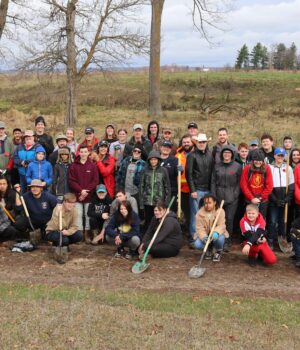WHITEWATER REGION (Cobden) — The Muskrat watershed will see improved water quality as 15,000 native trees and shrubs work to reduce run-off and stabilize eroding shorelines.
Watersheds Canada, the Muskrat Watershed Council and Algonquin College’s Waterfront Campus completed the second year of their joint Muskrat Lake Watershed Rehabilitation Project. The project sees to plant a total of 45,000 native trees and shrubs along agricultural shorelines over 3 years. To date, 30,000 native plants have been planted in the watershed.
The project uses Watersheds Canada’s Natural Edge Program to design and implement the planting. Participating landowners received a free site visit to discuss the current state and goals of their shoreline and then site parameters were measured. Using the Natural Edge App, a planting plan was created which outlined the planting compartments, the native species chosen to be planted, the financial breakdown, and the Landowner Stewardship Agreement. With generous funding from the Ontario Trillium Foundation, LUSH Canada, Whitewater Brewing Company, and M&R Feeds and Farm Supply, the program was completely free to the landowners.
In 2019, a total of six sites in the Muskrat watershed saw 3814 metres of shoreline naturalized using 15,000 native trees and shrubs. One agricultural property owner that took advantage of the program was Stephen Edwards.
“We were already thinking about planting trees on the site. When we heard about the Natural Edge program, it was a perfect fit for us”, said Edwards. Adding, “Almost 10,000 trees and shrubs were planted on our two properties. We thank all the volunteers who helped plant the species which will help the water quality”.
A driving force of the project is working with local community groups to locate planting sites and carry-out the project to reach our shared goals of a healthy environment and clean water preservation.
“It has been so great to work with Watersheds Canada and Algonquin College on this project. Hats off to the farmers who let us take over their land and plant. The agricultural community on a whole has been greatly supportive, and as a farmer myself this makes me so proud”, said Karen Coulas, Muskrat Watershed Council Chair and Co-Director of Agriculture.
Students from Algonquin College also played a role in protecting the watershed, helping on planting days and collecting water quality data.
“Watersheds Canada has devoted considerable time and resources to these planting initiatives in our community. As part of the Natural Edge Program, students at Algonquin College have received hands-on learning through water sampling, stream-bank assessments, and stream-bank naturalization in the Muskrat Watershed”, said Julie Sylvestre, Algonquin College’s Managing Director of Applied Research, Innovation, and Entrepreneurship.
“Most importantly, students are provided with the opportunity to be change makers in their community through projects that demonstrate a real benefit to the local environment”, Sylvestre adds.
This project provided students, volunteers, and farmers the opportunity to learn about the benefits of a natural shoreline and why they are so important. Native trees and shrubs were planted to improve water quality by filtering out excess nutrients and toxins before entering the waterway, as well as to help stabilize shoreline banks and create vital wildlife habitat.
The Natural Edge Program would not have been a success in the Muskrat watershed without the Muskrat Watershed Council, Algonquin College’s Waterfront Campus, the landowners who took part in the program, and the volunteers who helped plant.
“We had a very successful second year of our project and it was great working with our partners, the farmers, and all the volunteers who helped us plant. The positive impact we’ve made in the Muskrat watershed will be felt for years to come and I look forward to continuing in 2020 with our final year of the project”, said Chloe Lajoie, Natural Edge Program Manager, Watersheds Canada.
This program was generously funded by the Ontario Trillium Foundation, the Daniel and Susan Gottlieb Foundation, LUSH Canada, Whitewater Brewing Company, and M&R Feeds and Farm Supply.
Interested agricultural property owners in the Muskrat watershed are encouraged to contact the Natural Edge to see if they are eligible to participate in 2020, the final year of funding for this project, by email at [email protected] or visit the website.







![Kenopic/Smith Auction [Paid Ad]](https://whitewaternews.ca/wp-content/uploads/2018/10/advertising-100x75.jpeg)

